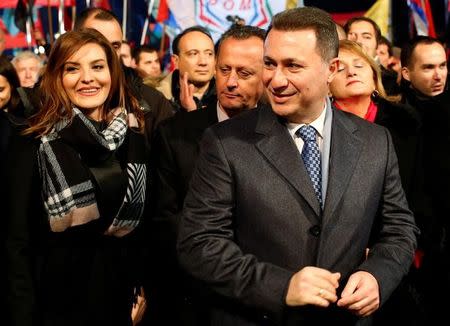Veteran leader Gruevski seeks comeback in Macedonian poll

By Ivana Sekularac and Kole Casule SKOPJE (Reuters) - Macedonia's veteran nationalist leader Nikola Gruevski sought re-election as prime minister on Sunday, in a vote called almost a year after his government stepped down amid protests over alleged corruption. Most recent opinion polls have shown a lead for his centre-right VMRO-DPMNE - the party that has led governing coalitions in the former Yugoslav republic for the best part of a decade. His main challenger is the Social Democratic Union of Macedonia (SDSM) whose leader, Zoran Zaev, accused the government last year of wiretapping tens of thousands of citizens and released recordings appearing to implicate the government in corruption. Gruevski denied any wrongdoing. "I am hoping that this madness will stop after the election. I hope a better party will win, the one that promises more jobs and a better economy," said unemployed 52-year-old Orde Serafimovski. A caretaker government is currently in place, under the terms of an EU-brokered deal to end the political crisis in the landlocked nation of 2.1 million people. The European Union had long criticised Gruevski's record on democracy and the rule of law, but also needs Macedonia's cooperation to help contain its migration crisis. The country sits on a major migration route into the bloc. Macedonia is a candidate to join the European Union but has never begun accession talks, partly because of criticism of its reform record and because of an entrenched row with neighbouring EU member Greece over the name Macedonia, which also belongs to a northern Greek province. "I am hoping that VMRO will win," said Toni Mihajlovski, a 52-year-old worker at a grocery store in Skopje. He said he was concerned that if the SDSM won, Albanians would be given more autonomy and the government would make concessions over the name issue to get the EU membership talks started. "I am afraid if the other party wins there would be no Macedonia." Eleven parties and coalitions are running, including four representing the ethnic Albanian community, which accounts for around a third of the population. Traditionally, an Albanian party joins a coalition government as junior partner. The polls close at 1800 GMT. Preliminary results are expected after 2000 GMT, and a final result on Tuesday. (Writing by Georgina Prodhan; Editing by David Evans and Andrew Heavens)

